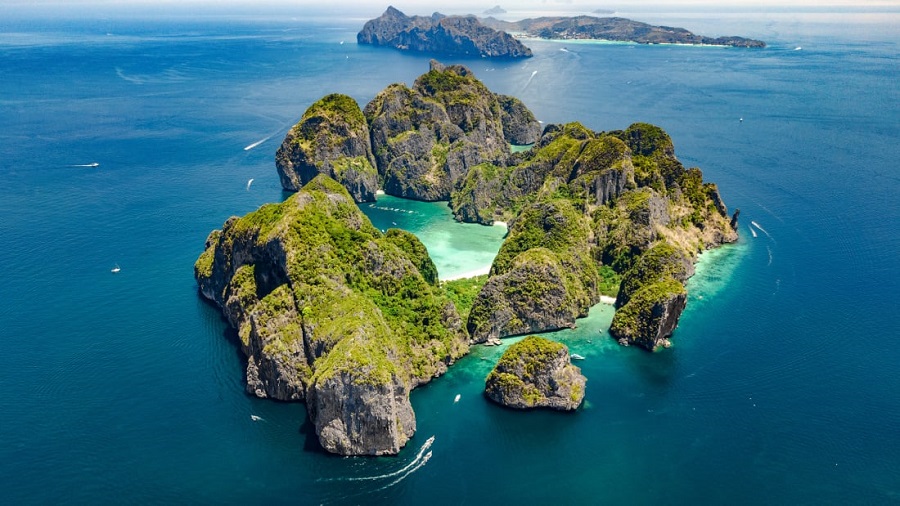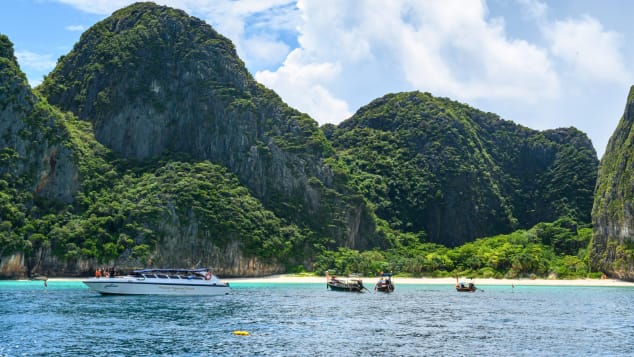
Officials in Thailand have announced a reopening date for one of the country's most famous attractions.
Maya Bay, a beautiful cove made famous by "The Beach" -- a 2000 film starring Leonardo DiCaprio -- will reopen to tourists on January 1, 2022, according to a statement issued by Thailand's Department of National Parks.
But unlike the many attractions that have been reopening in recent months, Maya Bay's initial closure had nothing to do with the pandemic.
The popular destination has been off limits to tourists since June 2018 as officials embarked on a rejuvenation program aimed at reviving the popular area's decimated corals.
Located in Thailand's Hat Noppharat Thara-Mu Ko Phi Phi National Park, Maya Bay is part of Phi Phi Leh -- one of the two main Phi Phi islands in Krabi province.
Unlike the much larger Phi Phi Don, home to an abundance of budget and mid-range accommodation options, Phi Phi Leh was only open to day-trip visitors prior to the closure of Maya Bay.
But it's been one of the country's most famous attractions over the last two decades, thanks much in part to the global success of "The Beach," part of which was filmed there.

"The Beach," starring Leonardo DiCaprio, was based on the 1996 novel of the same name by Alex Garland.
20th Century Fox
On a CNN visit to the area several weeks prior to its closure, visitor numbers multiplied by the minute as boats poured in and out of the bay. Many visitors to the area were day-trippers from Phuket, which is less than an hour's ride away by speedboat. According to official figures, the bay was receiving an estimated 5,000 visitors per day on average in 2018.
"Maya Bay has been continuously receiving interest from tourists around the world. But this has also caused (the natural area) to deteriorate, especially the corals," said Natural Resources and Environment Minister Varawut Silpa-Archa in the statement issued November 14.
"After shutting down Maya Bay to revive and restore it, up until the present, it has returned to a good condition."
New entry rules
The reopening comes with several caveats. Boats will not be able to enter the bay. Instead, drivers will have to drop passengers off at a pier set at the back of the island away from the famed cove.
Only eight speedboats will be allowed to dock there at a time, and visits will be capped at one hour, with a maximum of 300 tourists allowed per round, from 10 a.m.-4p.m daily.

This picture taken on October 4, 2019 shows boats at the Maya Bay boundary line set by the Thai National Park, Wildlife and Plant Conservation Department. The beach is off limits.
Mladen Antonov/AFP/Gety Images
In the statement, Varawut said the government is now working to finish the new piers and set up designated areas for water activities, which will be ready for the January 1 reopening.
Originally, officials said Maya Bay would be closed for just four months. But they extended the closure by an additional two years, citing the need for more time to replant coral in the bay and expand the island's visitor facilities.
Presently, boats are allowed to enter the outer limits of the bay. Maya Bay's shores are off limits, but visitors can still view the beach from their boat. Snorkeling in the front of the bay in designated zones is also still permitted.
Thailand reopens to vaccinated travelers
On November 1, Thailand relaxed its quarantine restrictions for travelers who have stayed a minimum of 21 days in one of 63 approved "low risk" countries and territories -- including the United States, the United Kingdom, Australia, India and Canada.
Incoming fliers who meet the updated requirements only need to stay one night in a government-approved hotel while they await the results of a Covid-19 test administered upon arrival.
Tourists who aren't fully vaccinated with an approved vaccine must quarantine in a pre-booked, government-approved hotel for 10 days upon arrival.
The reopening comes on the eve of Thailand's tourism high season. In a statement issued in mid-October, Prime Minister Prayut Chan-o-cha said the relaxation of restrictions was needed to allow Thailand to take advantage of travelers hoping to visit during upcoming winter holidays.
"We must act quickly but still cautiously and not miss the opportunity to entice some of the year-end and New Year holiday season travelers ... to support the many millions of people who earn a living from our tourism," he said.
Prior to the pandemic, tourism contributed around 15% of Thailand's GDP, according to World Bank figures.













